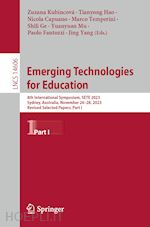
Questo prodotto usufruisce delle SPEDIZIONI GRATIS
selezionando l'opzione Corriere Veloce in fase di ordine.
Pagabile anche con Carta della cultura giovani e del merito, 18App Bonus Cultura e Carta del Docente
This two-volume set LNCS 14606-14607 constitutes the revised selected papers of several workshops which were held in conjunction with the 8th International Symposium on Emerging Technologies for Education, SETE 2023, held in Sydney, Australia, during November 26–28, 2022\3.
The 46 revised full papers presented in this book were carefully reviewed and selected from 23 submissions.
SETE 2023 presented the following six workshops:
First International Workshop on Cognitive Neuroscience of Language Learning (CLNN).
Second International Workshop on Digitalization In Language And Cross-Cultural Education (DLCCE).
Sixth International Workshop on Educational Technology for Language Learning (ETLL).
Second Workshop on Hardware And Software Systems as Enablers for Lifelong Learning (HASSELL).
Ninth International Workshop on Peer Review, Peer Assessment, and Self Assessment in Education (PRASAE).
.- SETE MAIN TRACK.
.- Perceptions of High School Mathematics students in the use of technologies for educational purposes.
.- Social innovation on educational AI developments. A case study on social participation on designing AI generative models for diversity.
.- Empowering collaboration through immersive technologies fostering intercultural competencies.
.- Investigating the Adoption of Machine Translation in Foreign Language Learning: the Instructors’ Perspective.
.- On the dynamic generation of items within an assessment test using genetic algorithms.
.- Engagement at a Distance Online Instructor Behaviors to Encourage Student Success.
.- EduPort: an Intelligent Learning System Based on Deep Learning A Preliminary Evaluation.
.- Examining the Technological Pedagogical Content Knowledge (TPACK) of Biology Educators: A Case Study on Pre-service and
In service Teachers in Preparation for Applying STEM Education.
.- Online Performance Prediction Combined Prior Knowledge and Deep Learning Models.
.- On the impact of augmented reality for rehabilitation treatment: early results from a study with children.
.- Oriented Classroom Instructional Behavior Recognition Dataset Construction and Benchmark.
.- An approach to teach Text Analysis to Digital Humanists, a qualitative evaluation.
.- Artificial Intelligence and Learning of Students with Dyslexia: a Brief Review.
.- Workshop CLNN.
.- Proficiency effect on the development of L2 derivational knowledge.
.- Mental Simulation of Implied Orientation Information in Chinese Sentences.
.- Workshop DLCCE.
.- Reliability of Effort Indicators for Human Translation and Post editing of Machine Translation: An Eye Tracking and Keylogging Study Involving Student Translators.
.- Translation Practice and Competence Enhancement in the Age of AI: Applying ChatGPT to Translation Education.
.- Designing An Integrated Teaching Model of College English Course Assisted by Digital Platforms.
.- Knowledge-Network Based Translation Learning and Learners’ Perception.
.- The Influencing Factors of Learning Motivation in the Computer-Aided Speaking Course: An Empirical Approach.
.- An Experiment on Translation Education Information System Driven by Knowledge Network Management.
.- Chinese Students’ Perception and Demand on AI Assisted Interpretation Technology and its Implication on Education of Interpreters.
.- Closed-Loop Automation with Python in Translation Technology Teaching the Acquisition of a Meta-Technology Competence Through Project Based Learning.
.- A Digitalized Approach to Discourse Production and Reception from the Perspective of Proximization Theory.
.- Research on the Teaching Model Design and application of Corpus based Translation Curriculum Group for Micro-majors.











Il sito utilizza cookie ed altri strumenti di tracciamento che raccolgono informazioni dal dispositivo dell’utente. Oltre ai cookie tecnici ed analitici aggregati, strettamente necessari per il funzionamento di questo sito web, previo consenso dell’utente possono essere installati cookie di profilazione e marketing e cookie dei social media. Cliccando su “Accetto tutti i cookie” saranno attivate tutte le categorie di cookie. Per accettare solo deterninate categorie di cookie, cliccare invece su “Impostazioni cookie”. Chiudendo il banner o continuando a navigare saranno installati solo cookie tecnici. Per maggiori dettagli, consultare la Cookie Policy.